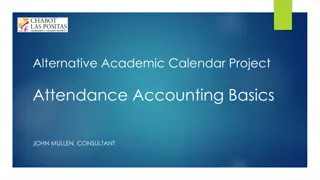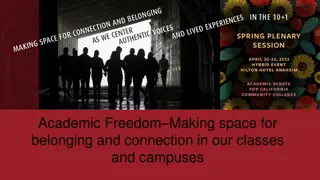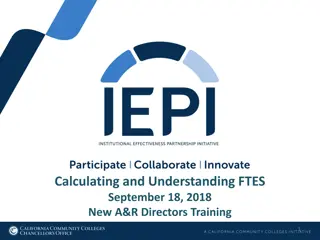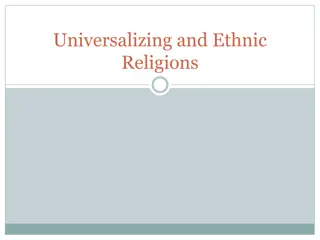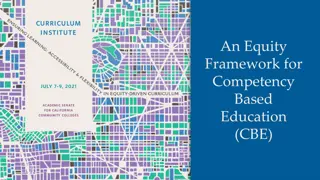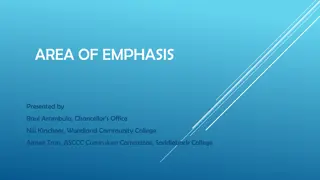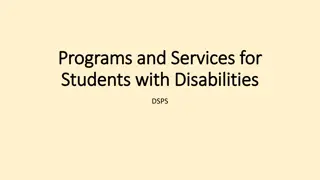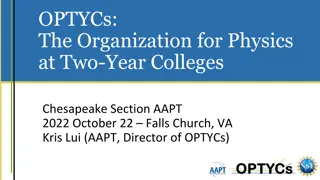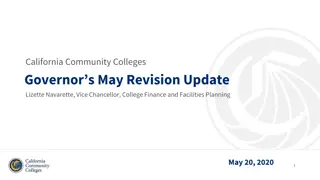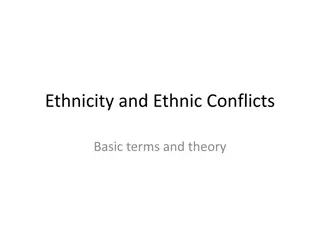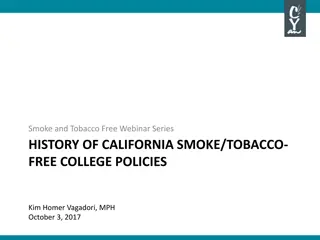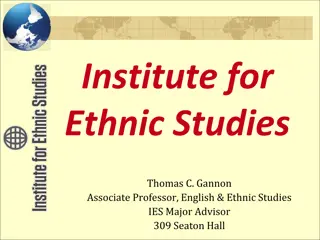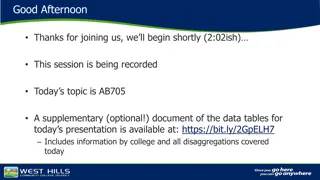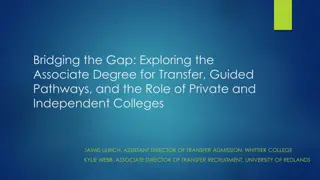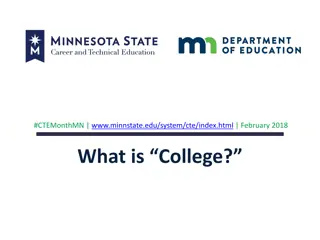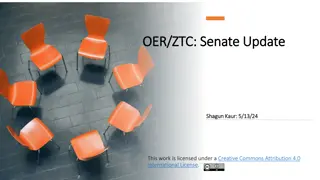Exploring Ethnic Studies in California Community Colleges
Delve into the evolution and significance of Ethnic Studies in California Community Colleges, including the regulations, leadership initiatives, curriculum development, and the historical context. Join the discussion on the relationship between Ethnic Studies and Academic Freedom, highlighting key milestones and challenges in this educational field.
Download Presentation

Please find below an Image/Link to download the presentation.
The content on the website is provided AS IS for your information and personal use only. It may not be sold, licensed, or shared on other websites without obtaining consent from the author. Download presentation by click this link. If you encounter any issues during the download, it is possible that the publisher has removed the file from their server.
E N D
Presentation Transcript
Ethnic Studies in the California Community Colleges: Academic Freedom Friday, April 8 | 1:30-2:45
Description California is leading the way in Ethnic Studies education! Title 5 Regulations recommended by the Academic Senate for California Community Colleges (ASCCC) delegates were approved by the Board of Governors in July 2021. Since then, the California Community Colleges Chancellor s Office in collaboration with the ASCCC, the CCC Ethnic Studies Faculty Council along with other practitioner groups have formed an Ethnic Studies Leadership Steering Committee and Taskforce to provide guidance around a timeline for implementation, communication with CSU and UC, professional development, and core competencies. In addition, minimum qualifications for Ethnic Studies core disciplines have been developed, and creation of C-ID courses and Transfer Model Curriculum are underway. Join this session for a deep-dive discussion about the history, progress made, work being done, challenges, what the future may hold for Ethnic Studies education, and the relationship between Ethnic Studies and Academic Freedom. 2
Stephanie Curry, ASCCC Area A Representative, California Community Colleges Curriculum Committee (5C) Co-Chair Presenters Carlos Reyes Guerrero, California Community Colleges Ethnic Studies Faculty Council (CCCESFC) Co-Chair, Los Angeles City College WELCOME! Virginia Ginni May, ASCCC Vice President, Intersegmental Curriculum Workgroup (ICW) Chair 3
Overview A Brief History of Ethnic Studies Defining Ethnic Studies Discipline Title 5 Regulations Ethnic Studies Leadership Steering Committee and Taskforce timeline for implementation communication with CSU and UC professional development core competencies Minimum Qualifications for Ethnic Studies Core Disciplines C-ID courses and Transfer Model Curriculum Cross Listing and Ethnic Studies Relationship between Ethnic Studies and Academic Freedom 4
A Brief History of Ethnic Studies San Francisco State University supported the first Black Studies Program in 1968, which became a department a year later. Between 1968 and 1973, roughly 600 programs and departments were created. The Black Studies programs at California Community Colleges like Merritt College and Fresno City College was established in 1969. At the same time Chicana/o Studies programs were being established at UCLA over the next decade. Ethnic Studies programs developed and were integrated into the field of Social Science and Humanities, with many Ethnic Studies alum earning degrees in Sociology, Psychology, English and Counseling, among other fields. Largest Chicana/o Studies Department CSU, Northridge, over 24 tenure-track faculty, over 25 adjunct faculty. 5
Defining Ethnic Studies Discipline Ethnic Studies is the umbrella term for the department/area that houses programs/courses in the four following disciplines: African American/Africana/Black Studies American Indian/Native American Studies Asian American Studies Chicano/a/Latino/Mexican American Studies Ethnic Studies can also represent an introduction to comparative Ethnic Studies courses that is centered on the four above disciplines. Interdisciplinary (holistic, intersectionality) is the epistemology of the discipline(s). 6
Title 5 Regulations Prior to July 2021: Title 5 regulations required that colleges offer a course in Ethnic Studies, no requirement for students to take a course September 2020, ASCCC Executive Committee Agenda: discussion on strengthening Ethnic Studies requirement November 2020, ASCCC Resolutions F20 09.03 Ethnic Studies Graduation Requirement F20 09.04 Clarify and Strengthen the Ethnic Studies Graduation Requirement Through the California Community Colleges Curriculum Committee (5C) process to change title 5 regulations began 7
Title 5 Regulations Approved by the California Community Colleges Board of Governors, July 2021. Anticipated Implementation 2024 Strength of Law (3) Satisfactory completion of a transfer-level course (minimum of three semester units or four quarter units) in ethnic studies. This requirement may be satisfied by obtaining a satisfactory grade in a course in ethnic studies taught in or on behalf of other departments and disciplines. (title 5 55063) Note this is a graduation requirement. Courses can be also used to fulfill GE requirements. 8
Ethnic Studies Leadership Steering Committee and Taskforce ASCCC, CCC Ethnic Studies Faculty Council (CCCESFC), and California Community Colleges Chancellor s Office (CCCCO) Timeline for implementation Communication with CSU and UC Professional Development Core Competencies Monthly meetings starting fall 2021 Membership Leadership Steering Committee (2 ASCCC, 2 CCCESFC, 2 CCCCO) Taskforce (2 CCCCO, 2 ASCCC, 1 CCCESFC, 4 ES Faculty, 1 5C, 1 student, 1 Articulation Officer, 1 Admissions and Records, 1 CIO, 1 CSSO) Memo with Guidance expected at end of spring 2022 9
Minimum Qualifications for Ethnic Studies Core Disciplines Current: African American Studies Chicano Studies Ethnic Studies Proposed (2nd Hearing, Friday, April 8, 2022 8:00 am 9:00 am): Pending Spring 2022 Plenary Resolutions Asian American Studies S22 10.01 Native American/American Indian Studies S22 10.02 Next Steps CCCCO Consultation Council (estimated: April 2022) CCCCO Board of Governors (estimated: 1st Read May 2022, 2nd Read/Action July 2022) 10
Minimum Qualifications for Ethnic Studies Core Disciplines Equivalencies: Academic and professional matter or 10+1 role Faculty should be leading this conversation Include discipline expertise to support review or create local policies Should not be used to avoid hiring faculty with expertise Often used when exact titles of degrees do not match the minimum qualifications, such as interdisciplinary degrees. Know your local process ASCCC Paper: Equivalence to the Minimum Qualifications, Adopted Fall 2020 11
C-ID Courses and Transfer Model Curriculum Process: Social Justice Studies Area of Emphasis Transfer Model Curriculum Ethnic Studies Discipline Input Group (DIG) February 26, 2021 (100+ attendees) time to advocate for ES FDRG/TMC March 25, 2021 (60+ attendees) April 23, 2021 (60+ attendees) Outcome: Ethnic Studies FDRG separate from Social Justice Studies Area of Emphasis 5 TMCs to be created Faculty Discipline Review Group (FDRG) 12
C-ID Courses and Transfer Model Curriculum TMC Expected Completion Date: February 2023 FDRG Composition: Chicana/o Studies: CSU Fullerton & LACC African American Studies: CSU Long Beach & San Diego Mesa College Asian American Studies: CSU Long Beach & City College of SF Native American Studies: CSU San Marcos & Sierra College Advisory - Articulation Officers: CSU San Bernardino & Las Positas College 13
C-ID Courses and Transfer Model Curriculum Draft Transfer Model Curriculum (TMC): Ethnic Studies Ethnic Studies: African American Studies Ethnic Studies: American Indian Studies Ethnic Studies: Asian American Studies Ethnic Studies: Chicana and Chicano Studies The FDRG is currently reviewing feedback from the field for all proposed Ethnic Studies TMCs. Be on the lookout for future announcements through the ASCCC listservs. C-ID Website: https://c-id.net/tmc#TMCOpen
Cross Listing and Ethnic Studies From California Community College FAQs on CSU GE Breadth Policy (01/21/2021) : Is cross listing of Area F Ethnic Studies courses with non-Ethnic Studies courses allowed? Yes. If a course is approved via traditional curricular processes for cross-listing (meaning both departments agree to this cross-listing) and the course meets the core competencies and is approved by the campus GE committee for Area F, then the course meets the requirements. For example, if a course on the History of African Americans in the United States is cross-listed with a course with an African American Studies prefix and a History prefix, and is approved for Area F, students would receive credit for meeting Area F no matter which section of the course they took. While this guidance allows for cross-listing, it should not happen without participation of impacted faculty in all disciplines. Any pre-existing course that will be newly cross-listed with Ethnic Studies should be able to be taught by either the original discipline or Ethnic Studies faculty. 15
Cross Listing and Ethnic Studies Definition and resources: Cross-listing or cross-referencing courses is the practice of assigning an identical course outline of record (COR) to two or more subject area codes (e.g., SOC 10 and PSYCH 10). Distinct from the articulation practice of course equivalency; and Distinct from discipline assignment in the COR. Cross-listed courses: COR for each course are identical, with the exception of the subject code Includes discipline assignment and all course content Implications and Considerations for Cross Listed Courses, ASCCC Rostrum, February 2022 Resolution S22 9.01 for consideration at ASCCC Plenary Session 2022
Cross Listing and Ethnic Studies Assigning Courses to Disciplines: Determine the minimum qualifications necessary to teach a course. Local academic senates maintain responsibility for placing courses in disciplines ( 53200(c)(1)). All credit and noncredit courses must be placed within a discipline or disciplines. Not required for community service courses Using and or or Does it matter? Who Gets to Teach that Course? The Importance of Assigning Courses to Disciplines, ASCCC Rostrum article, September 2016
Relationship between Ethnic Studies and Academic Freedom Accrediting Commission of Community and Junior Colleges (ACCJC) Eligibility Requirement 13, 20 Standard I.C.7 Catalog Requirements What about Academic Freedom? California Code of Regulations Title 5 51023 Boards must adopt policy on academic freedom California Education Code Nothing yet SR 45 (Min) See Resolution S22 6.02 for consideration at ASCCC Plenary Session 2022 American Association of University Professors (AAUP) 1940 Statement 18
Relationship between Ethnic Studies and Academic Freedom What is Academic Freedom? Academic freedom allows for invention, scholarship, and creative enterprises that support and enrich humanity. The common good depends upon the free search for truth and its free exposition (Franke, n.d.). The connection between academic freedom and equity is fundamental. Without the rights of faculty to speak, research, and pursue diverse ideas, equity is not possible. Academic freedom allows faculty to academically challenge racist ideology and structures in the context of their expertise. By asserting their right to academic freedom and using that right to challenge traditional theories, scholars have been able to create a more diverse and robust exchange of ideas that introduces students to that multitude of tongues identified by the Supreme Court. The results of this progress are evident in the proliferation of disciplines such as ethnic studies, gender studies, and LGBTQ studies, among others Protecting the Future of Academic Freedom During a Time of Significant Change, Adopted Fall 2020: https://www.asccc.org/sites/default/files/Academic_Freedom_F20.pdf Academic Freedom and Equity, Rostrum article November 2020: https://asccc.org/content/academic-freedom-and-equity 19
Relationship between Ethnic Studies and Academic Freedom Let s Talk! 20






